I, like many of my Indie brethren, hate Cloners. I honestly believed that this would not be a controversial opinion but I was wrong. A surprising number of people think that clones are a-o.k. Their arguments for thinking cloned are a-o.k. are oft repeated. Whenever someone writes an article about shitty cloners cloning some game the same arguments tend to crop up. Since I’ve heard them so many times I figured I would respond to all of them in one place. Maybe this way I’ll stop being tempted to wade in to every hundred comment debate-wasteland on cloning.
If you don’t know what cloning is or want a primer you can read Sarah’s post on the subject. It has some great specific examples.
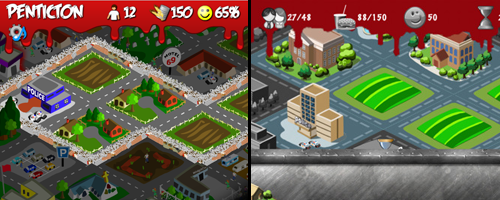
Arguments for cloning:
1: Everything is a Clone!
Here is the big one. This is the most commonly used argument that clones are fine. It is simple. The argument is that game development is equivalent to cloning. Many of the great games in history are simply clones of something else. Some of the most popular examples are: Doom = Heretic = Rise of the Triad, Dune 2 = Warcraft, Infiniminer = Minecraft.
The problem with this argument is: no they aren’t! All of those games have significant changes to their game design. Maybe you’ve never actually played these games? Maybe time has made you forget how different they are from eachother, but they are not clones! They are similar, but not clones! But ha! Where do you draw the line between similar and clone? Well that’s argument number 2.
2: It’s a Fuzzy Line So There’s No Such Thing
Where is the line between clone and honest iterative improvement? I don’t know precisely where the line is. I can’t mathematically define it. I can’t write down a definition of the line. But that doesn’t really matter because so many clones are way over the line. I don’t have to know exactly where the line is to know that a lot of these horrible clones are on the wrong side of it. They are so aggressively cloney they never even imagined there was a line to consider. I can see arguing about whether a specific example is or isn’t over the line. But I can’t understand arguing that the line doesn’t exist because it’s fuzzy.
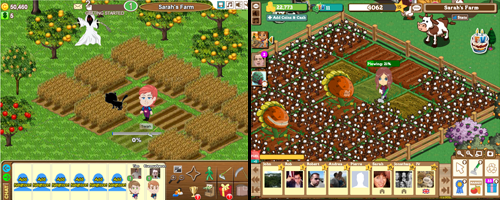
3: We’re Going to be Sued Into Oblivion!
Many of us are not calling for new laws. Our societies haven’t really figured out how to protect intellectual property. It’s a hard problem and the Indie game community doesn’t have anywhere near the required heft to make laws happen anyway. So since laws aren’t going to happen there’s no reason to worry about that dark dystopian future. But that doesn’t mean cloning isn’t reprehensible. Just because something is legal doesn’t make it moral (I’m sure no one is going to argue with me on that point).
4: You Deserved to get Cloned
If someone can write your game better than you or serve a market you aren’t serving then good for them. You deserve to get cloned.
We’re working on it dude! We’re trying to get our iPhone versions out but it takes some time. Especially since, unlike the cloners, we have to babysit the original release and might have to assemble a small team to make the new version. Everyone has strengths and weaknesses. The cloners strength is getting something shipped. Our strength is inventing something elegant and fun. You can’t let us starve or you will lose your source of elegant and fun.
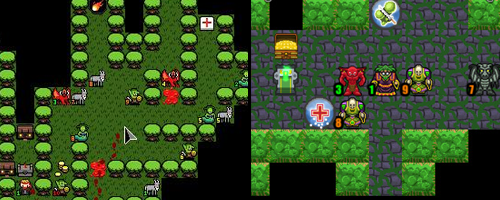
5. Game Design Has No Value
So here’s the one that really gets me. This one feels like people spitting in my face. It often comes out as “they changed the graphics so it’s fine” or “it’s more polished so they deserved it”. I love game design. I’m writing a game right now that I am in love with. It’s new, it’s crazy, it’s fun (hopefully!). I spent two years prototyping stuff before I had this idea. I have since spent nine months working on it and a lot of that time has been spent trying to design it. I think about game design obsessively. I have done major rewrite after major rewrite to try to discover how to make this game work. I theorise, I code, I playtest, I start over. It is really really hard to design a fun new game.
I think part of why people think it’s easy is because a good game is (ideally) simple and elegent. Since most people have never tried to design a game they don’t really know what’s involved. You will hear the phrase “the best ideas are the simple ones aren’t they?” and that’s true. But what that phrase doesn’t capture is the immense amount of work it takes to chisel a horrible lump of granite into something simple and elegent.
If you think it’s o.k. for someone to lift 2 years of my work, slap a panda on it, and beat me to the iPhone then you are a massive dick.
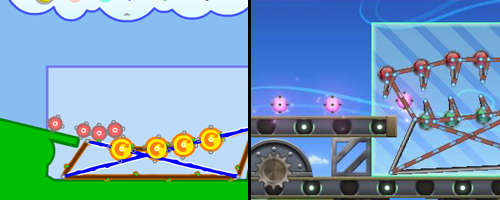
6. It’s Everywhere and There’s No Way to Stop It
It is everywhere and it always has been. Dirty damned cloners have always existed. But that doesn’t mean we can’t have an effect. If everyone in the world hated cloners then there would be fewer clones. People tend to avoid taking jobs that will make them seem like assholes to their peers. People don’t tend to buy things that morally outrage them. If we just keep stating our case reasonably and passionately we can make a difference to the culture of games. The only thing you hear more than “cloners will always exist” is “video games are a young medium”.

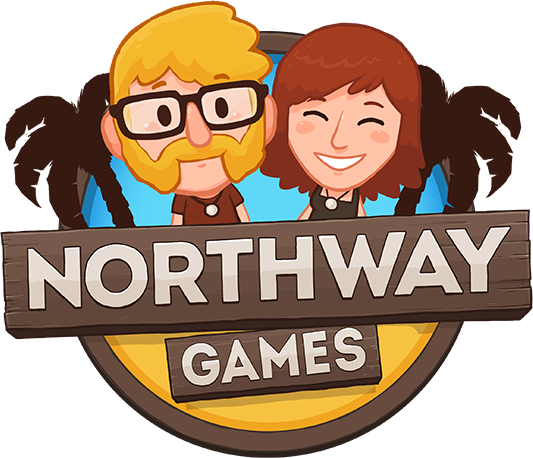
Comments
31 responses to “In Defense of Hating Cloners”
[…] about cloning games is in fashion this season. Colin and Sarah both wrote about it on their blog recently, and there’s been numerous accusations […]
[…] about cloning games is in fashion this season. Colin and Sarah both wrote about it on their blog recently, and there’s been numerous accusations […]
I agree with your opinion about Clones, but I think that there should be remakes of original games by third parties if they intend to pay for the copyrights. I believe in that way everyone would win, I guess..?
There are definitely ways to do it right. I’ve started making games that lift mechanics heavily from other games and I always contact the original developer to make sure they’re ok with it.
I’ve also seen games that were very small that deserved a big version. In one case I actually reached out to the developer and offered to help produce a big version. He was more interested in working on other things though. Which is fine. There are more games than developers. It shouldn’t be hard to find a way to make a great game without being a dick.
One irrelevant question: Is there any way to change my avatar’s picture?
I think you do it here?: http://en.gravatar.com/
It’s a good question. The wordpress system is an odd one.
Thank you Colin! It works!
I have to say, reading your post brings both joy and sadness to me. When I think of good or even great games, what comes to mind are the original designs, and even if they aren’t that good, most times their sequels are. That is what really saddens me about the issue of game cloning is that many times the people behind it are thieves, and many times, it ruins at least some peoples interest in a sequel to the original game, if they were unlucky enough to play the ripoff first. That is why I admire small time game developers like you, since you actually care about your games and want them to be good! Thanks for having the patience and will to continue making these games. Hopefully soon the ripoff/con artists will get theirs for being scummy.
Accurately and succinctly putting together all the points I’ve tried to make in the past, nice post. Gonna just link this in the future, saves a ton of time.
Playing a clone instead of the original is like going to see a cover band when the actual band is playing at the venue next door. It might be slick and technically proficient, but it’s only going to have a fraction of the original’s magic & energy.
Great post Colin, this issue definitely isn’t going away and we need to try what we can to address it.
It pains me to say it but trying to win over the casual iPhone gamer when it comes to cloning would be an futile exercise. They do not care that the game their friend is playing was cloned from an existing web game. Their concerns are more likely to be ->Is it fun? Is it fun enough to spend $1 on? Okay now that I’m bored with this game where is the next one I can play with for a buck today and maybe tomorrow.
The cloning issue will get dramatically worse too as more people adopt SmartPhones and casual gaming gets even more mainstream -> bigger market -> more money -> less care for the original / indie developers. Now if anyone who is making games purely just for the joy of creation this shouldn’t be a problem but for the developers & designers that would be happy to make some money from their cool creations then it’s a big problem. What can we do?
IMO there are only two effective ways this could be tackled right now:
1) Simultaneous multi-platform releases.
By releasing your web, desktop, iOS & Android at the same time it closes the window of opportunity + incentive for cloners and gives your game a big head start in terms of marketing, ratings etc. We are helping a couple of indie devs to do this and will update everyone on our results and experience.
2) Form a Indie Developer Association & Fund
This association would legally pressure the cloner studios & App markets to remove games that have breached copyright. So say we could rally 1000 indie developers to pledge $100 a year that is a decent fund to have some supportive legal people help put the clamps on. For cloners that are outside of the reach of copyright laws then the markets themselves would be targeted legally.
I think this second option is a worthy goal that we should strive for and could be useful as a long term solution but only the first option (multi platform releases) is within our reach right now and this is the option I am pursuing.
Cheers, Mike.
I just want to point out that the iOS gaming market is not exclusively casual. Personally I feel there’s a lot of scope there for deeper games, and certainly plenty of room for innovation. Not all of us like Plants vs Zombies and Angry Birds!
I think #1 is an unfortunate necessity now. Open development has become dangerous. Which is really too bad.
I think #2 is sketchyer. There’s no protected for game design in the law so clones are not illegal unless they steal code or art directly (tracing/reverse engineering is ok) or they infringe on your name’s trademark (Steam Pirates seems like a crazy name to me considering its closeness to Steambirds).
So there is no legal leverage to be had. And even if there was it would be a pretty simple thing for cloners to obviate the letter of whatever law you came up with.
So I think hearts and minds are the only way. The more people care the more people will care.
No more open development for casual games is a real shame. I love indie developer journals & streams but I agree if you have an original design or mechanic it is a big risk now.
I’m wouldn’t be 100% sure there isn’t any way a game design couldn’t come under copyright law. Does anyone know if there has been rulings before that have decided this one way or the other?
If that was the case then an army of indie game devs and fans that could publicly shame/pressure the app stores and markets might be the way to go.
I still think hearts and minds of your average casual gamer would be very very hard to win with their care factor being so low.
It’s really too bad open development and open prototyping is so dangerous. Open prototyping especially is a powerful tool.
Game design is 100% not covered by copyright. I spent my time talking to lawyers about this.
I agree with your posts but I have a question. How can a game creator with a low income multi release a game? Making a game for all platforms would cost much more money, more time (resulting in bigger loss of money) and if the game is not good or it has not a great graphic qualtity the creator will earn less money than he spent to create it.
If your web game is built primarily for Flash then you have a great starting point for a AIR Mobile project using FlashBuilder or CS 5.5. If If you set things up right you can build for iOS, Android, Desktop, the Web and even Smart TV (this one was fun :-; ) and reuse most of your code.
It is a lot easier if you start the project with that in mind but even existing games can be ported over. We are doing one of each of these scenarios at the moment and are happy so far with the results.
Re “if the game is not good or it has not a great graphic quality” well then probably no one is going to want to clone it so you don;t have to worry :P
I see. Two things. 1. I am not a game creator. 2. I am a fan of a game creator (who is a true artist [he makes games on HIS OWN, I mean he creates almost everything that his games need, such as music animations etc.]) but his income is LAME. Even though I am not sure that I am allowed to that, here is his site: http://www.fighunter.com .
Apparently, I’m a massive dick, but that’s ok
So, I posted my thoughts at my blog (here: http://www.circlecatgames.com/2011/08/25/cloning-mk2/), but the TL; DR is this:
1. Copying mechanics isn’t unethical, but cloning a game is.
2. The line between copying mechanics and cloning a game is whether there are any substantive differences in the game play. Dune 2 and Warcraft are in the same genre, but play out differently.
3. I don’t think that Ninja Fishing is a clone of Radical Fishing. The addition of Fruit Ninja-esque mechanics is the type of riffing on a genre (admittedly, a young and unformed genre) that should be encouraged.
4. Don’t release your game until you are happy with your monetization/marketing. Getting in the market first is important in this day and age. Don’t do someone else’s homework for them and make your own job harder at the same time.
5. Cloning of simple to grok games is always going to happen. Try to make the underlying structures of your game harder to guess, and therefore your game will be harder to clone.
Well said! I love this post.
I think one additional reason for the lack of clone-hate is that everyone has memories of when they first learned to program games. You have to learn a bunch of different stuff to create games, and one of the easiest ways to learn this “practice” of game development is to re-make a game. A lot of people do it, everyone knows this. Game design and game programming are very different beasts, so it’s easy to decouple. The problem comes, of course, when these get released. I think we can all understand the lure of releasing something you’ve spent time and effort creating. Even though, in this case, it’s more “re-creating” than creating. I think this is fairly common. We all know that there are a large segment of programmers (sometimes damn good ones!) who are just not all that creative people… obviously, it’s not everybody! But I think those people who write clones fall into that category.
@martin you are right. I am also doing the same thing first I just create the stage for my practice session then I am coming on the main path.
@Nadal: How can you create the stage? please give me hint so I am able reach the end of the game.
Graphics is really nice when game is starting. I just enjoyed it very much.
I have a game like this but this is very much friendly then mine. Its trick is very easy to play.
Is Rebuild 2 out?
After this post i keep seeing stuff from incredipede.
I’ve actually thought about this very sort of issue for a few years now. It’s a tricky one, but I think I’ve come up with a pretty good solution.
I just think that games, and probably all products, should be required to list their sources, as much as is possible. Writers of formal non-fiction typically give a bibliography, citing their sources. Why not pretty much everything else? With improved exchanged of information I think the world could increase transparency in many areas, not just books or video games. Imagine if on the package of food you eat it listed not only how much of the different ingredients is in it, but also where that particular ingredient came from. So, the sugar cane came from Jamaica, the wheat from Kansas, the preservatives from fields in China via a lab in Pennsylvania, and so on. You could even have the exact address where the ingredient came from and the name of the person/people that picked those ingredients.
It could be the same for games and plenty of other things. I think we can in fact take Rebuild as a pretty good example of this. In the post you linked to, Colin, Sarah says “SimCity was one of the inspirations for my game. So was X-Com and zombie movies like 28 Days Later and Dawn of the Dead.” I think that games should list in their credits not just those that actually made the game, but those that originally came up with the original ideas.
Traditionally I’ve been a fan of smaller government, but in recent years I’ve thought more and more that in many cases if the government doesn’t mandate certain things then there will be too little control and the risk of society falling apart and devolving into anarchy. So, I say that games, and lots of other things, should be required to list their sources.
If you ask me, change should begin at home though, when possible. So, I think that when Rebuild 2 is released, in this one Sarah ought to mention Sim City, X-Com, and the zombie movies as sources for the game, maybe even providing links to their websites. If in the future all games were to do that sort of thing, it would direct web traffic to the appropriate sources, and increase the revenue and the awareness of consumers of what goods may be available that are similar to the ones they presently have. I think that even a game like the cloned version of Rebuild above shouldn’t necessarily be removed even (optimally speaking). If the game clearly states that Sarah Northway’s Rebuild is the primary and overwhelming influence behind it and even provides a link directly to Sarah’s Rebuild, I think it would allow the gamer to choose which game they’d prefer to play.
While I do think that there probably are a lot of things we need more regulation for, I also think that too much regulation can stifle innovation. If the cloned version of Rebuild, or whatever game, actually has some improved features or interface or whatever, then I think the creator of that game should essentially be able to profit, at least to some degree, for their efforts. I just think that there has to be a balance there, between the potential for new innovation and developments, and regulating those developments so they, for instance, don’t completely violate the rights of the source. In some cases, there should probably be some exchange of money too. Like I said, since someone took the time and effort out to create a completely separate version of Rebuild, they should be able to profit from those efforts. But since virtually the whole game was cloned off Sarah’s Rebuild, Sarah should be able to benefit significantly from her own original design that has been copied. Perhaps, say, 40% of the revenue the cloned version of Rebuild gets should go to Sarah, seeing that even the graphics strongly resemble Sarah’s version. I think the more similar a copy is to its source, the larger the share of its revenue it would pay to that source. Thus, designers (and this could be applied to physical products as well, not just media) would be strongly incentivized to come up with and put a lot of new ideas into their works, thus promoting further innovation. Of course, this would also mean that Sarah would end up paying a bit of her own revenue from Rebuild to the sources that strongly influenced the game. But I would think only 10 or 20%, and think of it this way: Sarah LIKED her influences enough that she actually created a game that resembles them in some ways. Doesn’t she like them enough that she’d be willing benefit them as well from the success of her game?
I’m not saying that Sarah should go out right now and pay money to the influences behind Rebuild. But I do think that at least including them in the credits would be a step in the right direction. Maybe someday with some changes to the world like this we’ll see credit much more often given where it is due, and even more originality in future developments.
[…] be aware of. For instance, creating your custom tools can give your team some edge against “cloners” if they make it easier to build your innovative game. On the other hand, this can turn into […]
I might be too late to jump into this conversation—but while I think that it is definitely clearly that near perfect copy-type clones exist (e.g. that just have changed graphics etc), I think often times games/movies/books/etc are unfairly called clones when they are not.
In terms of games, the difficult question is how much of a new game mechanic does the person have to add for it to be a new game.
I don’t know about answering it legally. But for me the moral issue in terms of motivation probably comes down to this: Is the designer of the new game fired up about something she/he thinks she/he can do to IMPROVE the game over the original version? Bigger, better, faster, more options, more detail, more depth, etc… Does the new developer look at the old game, love it, but think “It actually had a lot more potential—I can add something to that.” or “This game was made 5 years ago…with things as they are now it could really be improved”. If either of these is the case I don’t think that the motivation is a cloning motivation. If, on the other hand, the motivation is, “Game X is popular—I bet I can crank out something exactly like game X without technically violating any copyright laws and get a cut of the market share.” then that is ethically problematic (more so when dealing with indie developers I think than when dealing with massive corporations—intellectual property gets tricky when it is lobbied for in congress).
Anyway, those are my to 2gp as both an instructor who has to deal with occasionally distinguishing between college students who are plagiarizing vs. those who are being inspired very closely by the text, and as a moral philosopher (that is my actual academic discipline, not a boast).
Pop